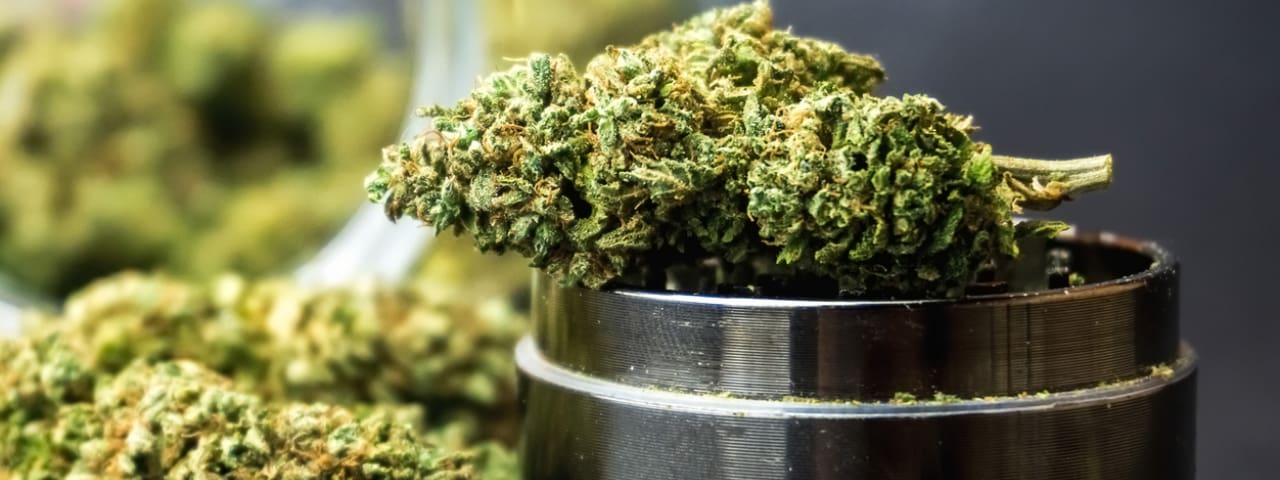What is CBDV?
3 min read



Cannabidivarin (CBDV) is a minor cannabinoid in cannabis that’s structurally similar to cannabidiol (CBD), but not exactly the same.
Like many cannabinoids, CBDV has possible health benefits, although there’s still a lot to learn about its full potential.
Get your medical marijuana card
Connect with a licensed physician online in minutes.
Larger purchase limits Access to higher potency strains Save up to 40% on product taxes Enhanced legal protection
What is cannabidivarin?
Researchers first discovered CBDV in cannabis in 1969. While more studies are needed, It’s believed that CBDV has many benefits in common with CBD because the two compounds are so structurally similar. CBDV is almost molecularly identical to CBD, except it has fewer carbons on its side chain.
The earliest research into CBDV took place in the 1970s, when it was studied as a potential treatment for certain types of seizures.
One study found that taking 10 milligrams (mg) of CBDV daily significantly reduces seizures in those with Rett syndrome, a neurodevelopmental condition associated with autism spectrum disorder (ASD).
In 2019, researchers found that CBDV may treat symptoms of ulcerative colitis. The study found that CBDV’s anti-inflammatory effects lower intestinal inflammation while balancing gut microbiota. It may also reduce nausea, according to animal studies.
How CBDV works
Like CBD, tetrahydrocannabinol (THC), and other cannabinoids, CBDV interacts with receptors in the endocannabinoid system that regulate bodily processes like inflammation, pain, and mood.
Studies have found that CBDV affects pathways in the nervous system called transient receptor potential (TRP) channels. These pathways help the nervous system react to environmental changes like temperature, as well as chemical changes in the body like stress.
Dysfunctional TRP channels may be associated with ASD. This relationship could explain why CBDV can treat seizures associated with Rett syndrome.
Risks and side effects
There’s no evidence that cannabidivarin causes serious side effects. In studies, participants tolerated daily doses of 10 mg CBDV.
Unlike THC, CBDV is not intoxicating, so there’s no risk of experiencing a “high” after taking it.
However, it’s important to be cautious with CBDV if you’re taking any medications. While no studies have shown that CBDV interacts with any medications, CBD does. Because of their similarities, it’s possible that CBDV may interfere with the the effectiveness and breaking down of certain prescription drugs.
How to use CBDV
CBDV exists in trace amounts in cannabis. Cannabis flower and full-spectrum cannabis products contain very low concentrations, with the exception of a few high-CBDV strains such as:
- CBDV Auto
- Dance World
- Euphoria
- Royal CBDV
- Royal Medic
Some companies make CBDV tinctures and other products using a concentrated CBDV extract, which delivers higher doses of the cannabinoid. They’re usually made from the hemp plant, making them federally legal. However, unlike cannabis sold in dispensaries, hemp products are not regulated, and may be created using dangerous chemicals or processes.
If you want to try CBDV for a health condition, ask your doctor about the best dosage and method of use.
The bottom line: CBDV shows promise as a medicinal cannabinoid
Research is still young, but CBDV already shows promise as a treatment for ASD-related seizures, ulcerative colitis, and nausea.
To experience its potential, opt for high-CBDV strains. With a medical cannabis card, you can explore these strains at a local dispensary. Contact Leafwell to start the process of getting your medical cannabis card today.
Resources
- An evaluation of understudied phytocannabinoids and their effects in two neutral models. https://pubmed.ncbi.nlm.nih.gov/34500785/
- Cannabis sativa: Much more beyond Δ9-tetrahydrocannabinol. https://www.sciencedirect.com/science/article/abs/pii/S1043661820311300Cannabis, a complex plant: Different compounds and different effects on individuals. https://journals.sagepub.com/doi/full/10.1177/2045125312457586
- Effects of cannabidivarin (CBDV) on brain excitation and inhibition systems in adults with and without Autism Spectrum Disorder (ASD): A single dose trial during magnetic resonance spectroscopy. https://www.nature.com/articles/s41398-019-0654-8
- Efficacy and safety of cannabidivarin treatment of epilepsy in girls with Rett syndrome: A phase 1 clinical trial. https://onlinelibrary.wiley.com/doi/epdf/10.1111/epi.17247
- Evaluation of the potential of the phytocannabinoids, cannabidivarin (CBDV) and Δ9-tetrahydrocannabivarin (THCV), to produce CB1 receptor inverse agonism symptoms of nausea in rats. https://bpspubs.onlinelibrary.wiley.com/doi/full/10.1111/bph.12322
- Pharmacology of cannabinoids in the treatment of epilepsy. https://www.sciencedirect.com/science/article/abs/pii/S1525505016305790
- The non-euphoric phytocannabinoid cannabidivarin counteracts intestinal inflammation in mice and cytokine expression in biopsies from UC pediatric patients. https://www.sciencedirect.com/science/article/abs/pii/S1043661819311077
- The progress of small molecule receptors against cannabinoid 2 receptor (CB2R). https://www.sciencedirect.com/science/article/abs/pii/S0045206823007368
Get Your Medical Card
Connect with a licensed physician online in minutes.
Larger purchase limits Access to higher potency strains Save up to 40% on product taxes Enhanced legal protection
Frequently asked questions
Find answers to FAQs about cannabidivarin (CBDV).


